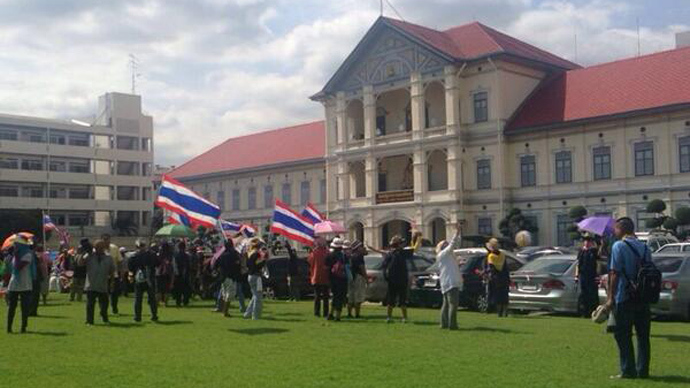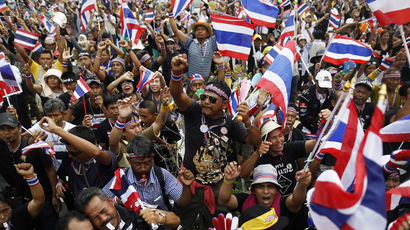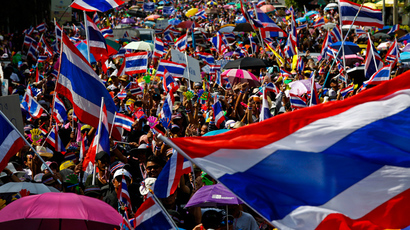Thai protesters capture army HQ in countrywide anti-government protests

Some 1,500 anti-government protesters in Bangkok have broken into the compound of the Royal Thai Army headquarters in their bid to topple the current government. The largely non-violent action could escalate, police say.
"We want to know which side the army stands on," shouted
one protester, according to Reuters.
The protesters gathered at the compound's front gates, forcing them open and flooding the premises, as they demanded for the head of the country's armed forces generals to choose whether they stand with the people or with the government of PM Yingluck Shinawatra. This took place while 100 soldiers stood guard.
Furthermore, the Bangkok police now fears that the situation could indeed escalate into a violent confrontation.
"We have received intelligence reports that there could be
violence tonight and tomorrow... we are increasing security
around key government and royal buildings." They said in a
statement.
Although Thailand's military has been publicly supported by the ruling party, it has remained largely on the sidelines of the current conflict.
Army deputy spokesman and Colonel Winthai Suvaree has expressed
the wish that "all sides... solve the problem with the
country's best interests in mind."
Elsewhere in the capital, about a 1,000 people seeking to oust Prime Minister Yingluck Shinawatra gathered outside the headquarters of her ruling part, shouting for them step down.
In the last few days, protesting crowds have taken over several ministerial buildings and cut power at the Royal Thai Police Force headquarters.
The opposition advancement saw little response from government’s security forces so far, with PM Yingluck calling on the protesters to commence negotiations.
"The government does not want confrontation and is ready to
cooperate with everybody to find a solution," she said in a
televised address on Thursday.
However the opposition crowds remain adamant in their intention to destabilize the government.
"Our only goal is that there must be no Thaksin regime in Thailand anymore," the protest leader Suthep Thaugsuban said, rejecting the prime minister’s call for talks, while a lawmaker from the ruling Puea party said that "the government will not instigate a violent situation because that is exactly what Suthep wants... we will not be provoked."
Yingluck, meanwhile, believes the protesters are running low on
strength, which further prompted her calls for supporters and
police not to aggravate the situation.
The protesters are currently stationed around five points in the
city, three of which are in the historic heart, one to the north
and another at the Finance Ministry, where they have been since
Monday.
Protesters accuse Yingluck of being a mouthpiece for her brother
and former PM Thaksin Shinawatra. The public outrage was sparked
by an amnesty law, which would allow Thaksin - who was convicted
in Thailand on abuse of power charges - to return from
self-imposed exile.
The main opponents of the former leader are the middle class who sharply disagree with the current government's authoritarian rule. That class is comprised mainly of generals, aristocrats, big businessmen and royal advisers, embittered because of the party's perceived disloyalty to the monarchy.
The group demonstrating against the current rule calls itself the
Movement for Democracy and numbers about 200,000 people. It also
represents some 45 unions, one of which represents Thai Airways.
The carrier on Thursday threatened that any harm coming to
protesters will result in the cancelation of all its flights. Its
president, Damrong Waikanee, warned that if the confrontation
turns physical, the union "will increase the pressure by
stopping the plane wheels from turning."
Thaksin, a billionaire telecommunications mogul who built his
political power via a series of populist measures, has ensured
the unfaltering allegiance of the rural poor, who twice voted him
into office in 2001 and 2005. In 2006, he was ousted in a
military coup.














